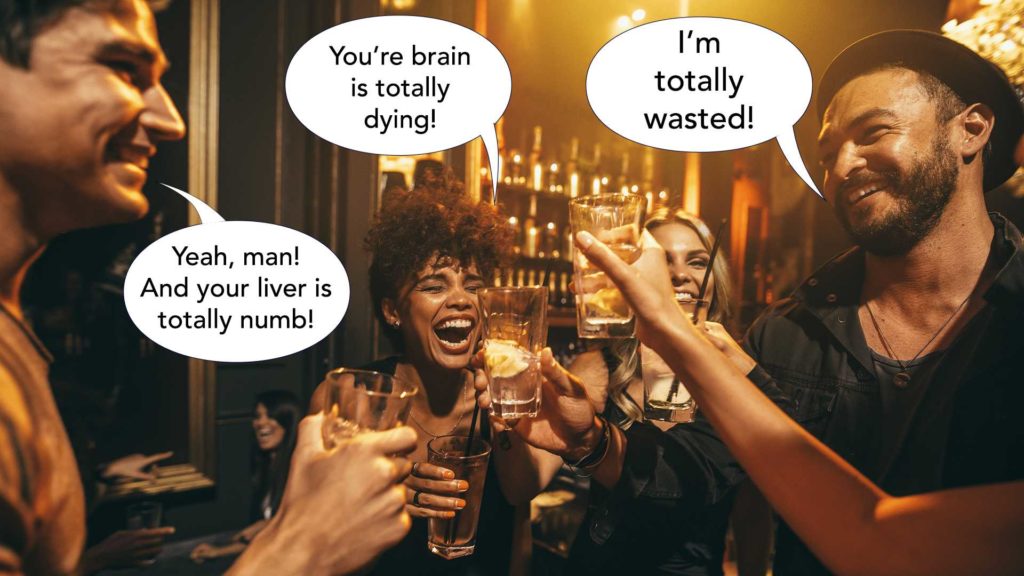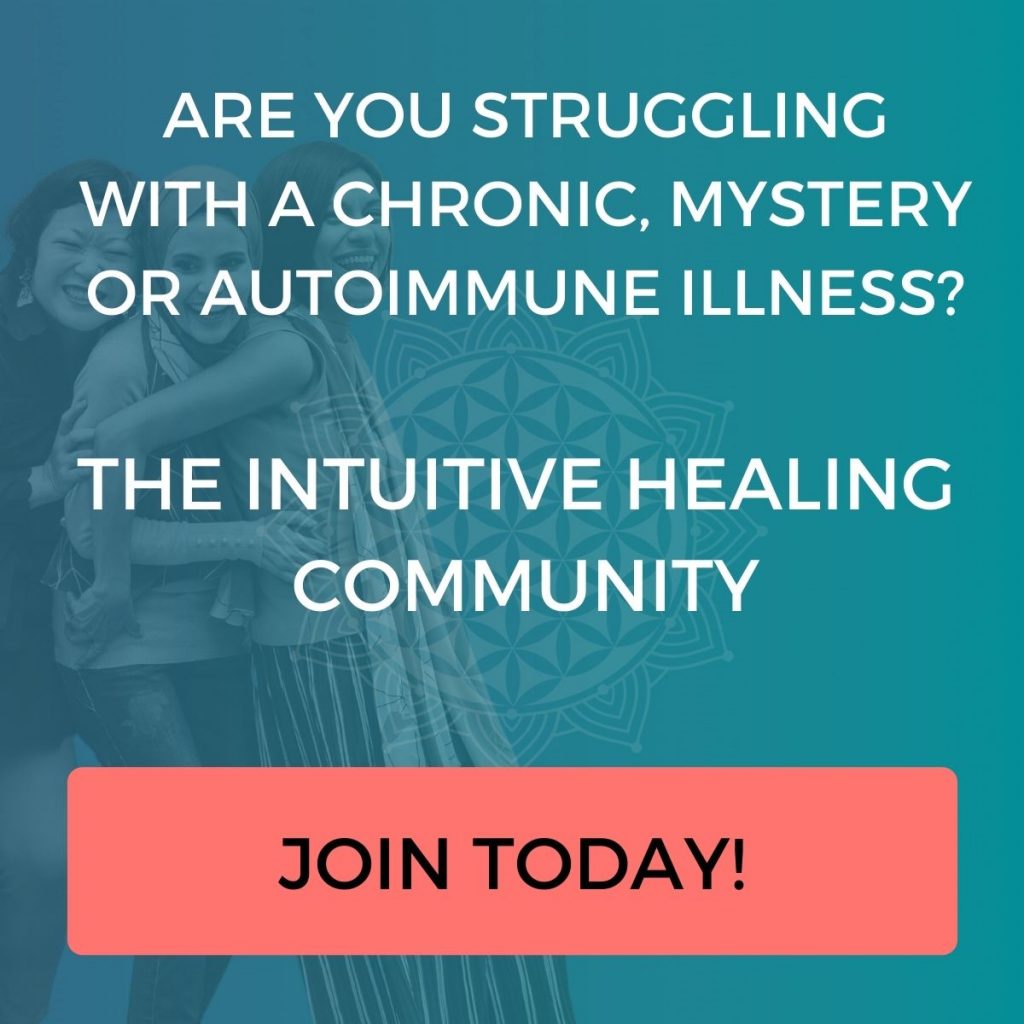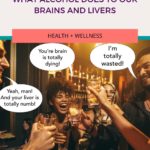I’ve never gotten drunk.
I’m not bragging or posturing as someone who always makes healthy choices (NONE of us are perfect); alcohol simply wasn’t part of my upbringing. But I get the appeal.
Alcohol has become synonymous with fun. For everything from weddings and graduations to cozy Friday nights at home, consuming alcohol has become so common that if you abstain, you immediately stand out. For most people, it’s unusual not to drink.
If you watch any of the countless movies or TV shows that show people constantly partying and drinking alcohol, it is fun. Or it’s luxurious. Or sexy. At the very least, drinking alcohol means you fit in.
But what’s the truth behind alcohol? What is it doing to our bodies? What’s at play when we feel drunk, and what does that mean for our health?
THE LIVER
It all starts in the liver.
We’re familiar with the idea that alcohol is not great for our livers. But what’s really happening inside the liver, and why is alcohol a problem? Medical Medium goes into detail in Liver Rescue.
When we drink, our liver’s job is to soak up every drop of the alcohol we consume to protect our brains and bodies. Alcohol in any amount is toxic to the body.
As the liver works to remove this threat from your system, it becomes stagnant and sluggish, and its ability to perform the over 2,000 chemical functions it has diminishes. Over time, alcohol injures the liver, creating scar tissue and potentially leading to cirrhosis of the liver, which, put simply, is a process of liver cells becoming damaged faster than they can be restored.
Liver damage from alcohol isn’t found only in heavy drinkers. Combining a single glass of wine every other night with a diet high in fats can lead to pericirrhosis – a Medical Medium term for the precursor to eventual precirrhosis and cirrhosis, which doesn’t show up on medical scans.
Alcohol soaks into all three levels of the liver, from its outer layer to the deep inner layer, where the most harmful toxins are stored to protect us. It takes 90 days for the body to expel all residual alcohol from a night of drinking.
But that’s just one piece. All of this happens inside the liver before someone starts to feel drunk, which is all about the brain.
THIS IS YOUR BRAIN ON ALCOHOL
When someone starts to exhibit outward signs of drunkenness, the liver has reached its limit and can no longer protect the brain. Instead of being soaked up by our liver, alcohol is now entering the brain.
When alcohol reaches the brain, it fakes the brain out. Alcohol is made from fermented sugars; the sugar in alcohol is a ghost of what it used to be. In Brain Saver, Medical Medium calls this methyl-sugar – sugar that’s been changed and denatured. The brain runs on glucose (sugar), and when alcohol bypasses the liver and reaches the brain, the brain sees alcohol as a welcome fuel source. Alcohol distracts the brain from actual sources of sustenance as it pushes healthy blood sugar to the side.
The liver would typically step in to provide stored glucose for the brain at this point, but the alcohol has numbed the liver so that it can no longer perform this critical function. It’s in defense mode.
Meanwhile, the brain is trying desperately to use the methyl sugar in alcohol to sustain itself since other glucose sources are unavailable. This is when we get “tipsy.” If someone is unable to function normally, it’s a sign that their brain is starving to death. Most symptoms of drunkenness have nothing to do with the alcohol itself. Slurred speech and loss of balance are signs that the brain is dying.
Drinking can reduce the brain’s ability to utilize healthy glucose by up to 95%, depending on how much alcohol someone consumes. Even 5% capacity is enough to keep someone alive through a bender, but this back and forth between normal and survival mode takes a massive toll, and the brain begins to die. In extreme cases, where someone drank so much that they’ve blacked out, a starving brain can cause death during sleep.
If it was just a matter of alcohol acting as a poison in the body, being drunk would mean discomfort but not impairment. We would still feel nauseous when we drink. We’d still vomit if we drank too much, but we wouldn’t lose our mental clarity or ability to function. As with any poison, we’d feel the effects, but it wouldn’t impair our ability to speak or walk. Alcohol tripping out the brain with ghost-like sugars is the true cause of drunkenness as the brain tries to use alcohol as a food source to stay alive, starving in the process.
THE ADRENALINE FACTOR
As our brains struggle to stay alive when exposed to alcohol, our adrenals kick in as a backup measure. Adrenaline is designed to provide a quick source of fuel to the brain in the absence of glucose. Adrenaline also floods the body when we’re in any kind of danger, so there is a one-two punch going on inside the body when we drink: adrenaline to feed and protect the brain and adrenaline as a response to a poisonous substance entering our bloodstream.
This is a huge missing piece in the conversation around alcohol addiction. Adrenaline is highly addictive, and adrenaline is an inevitable by-product of alcohol consumption. This is one reason many people who drink suddenly get very energized – screaming, laughing, yelling, and feeling invincible – it’s all from the adrenaline rush that accompanies a night of drinking.
Adrenaline affects everyone differently, making some angry drunks while others become sad or withdrawn. The adrenaline may kick some into high gear, increasing risky or uncharacteristically bold behavior, while it subdues others.
Adrenaline is the true “liquid courage” as it floods our bodies and overrides normal behavior, alongside brain impairment from a loss of its food source. And that sense of courage keeps us coming back for more, no matter how badly we feel the next day.
If you’re looking for support on your road to addiction recovery, my Recovering From Addiction Program is designed to provide empowering tools over 14 days of mindset support and teaching. The program includes 14 mindset calls (15 minutes each) and 14 teaching calls (30 minutes each), and a 70+ page recovery guide with recipes, meditation techniques, and other practical tools for lasting recovery from addiction to coffee, alcohol, chocolate, smoking, drugs, fat, and more.
DRINK SMART
This is all pretty heavy stuff. Understanding how alcohol truly affects our bodies is the definition of a “buzzkill.” But there are ways to protect yourself if you do choose to drink.
I had a client tell me once that they’d eat 1-2 bananas just before their first drink. In the morning, he’d have another banana with a glass of coconut water. His friends made fun of him for it, but he would be up at 9 am ready for the day while they’d all be passed out and miserable until noon. Without knowing it, he was protecting his liver and brain from glucose starvation which is the key to counteracting the harmful effects of drinking.
Before imbibing, be sure to fill your day with sources of high-quality glucose like bananas, papayas, or mangoes. Pairing these with foods rich in mineral salts like celery juice, spinach, and other leafy greens will build up your nutrient stores so that your brain, liver, and nervous system are armed with what they need to bounce back. And keep the fats low so that the glucose you’re bringing in can reach the liver and brain effectively.
The morning after is another crucial moment. We often hear that drinking more alcohol is an effective hangover cure, which is the opposite of what we should be doing to recover.
A hangover is caused by a brain depleted in glucose (headache, mental cloudiness, exhaustion) combined with the aftereffects of poisoning (nausea), so it makes sense that we often binge eat after a night of partying if our stomachs aren’t too upset. But reaching for pancakes slathered in butter with a side of bacon or half of a pizza isn’t going to get us better. These typical hangover meals won’t “sop up the alcohol” as much as they’ll flood the body with fats, impairing the liver further and continuing the adrenaline rush that wore off from the night before.
What we need is healthy glucose from fruits and starchy vegetables without fats. Instead of hash browns fried in oil, go for a large orange juice and a papaya boat. Skip the eggs if you want to feel better faster. Instead, whip up a delicious green smoothie with spinach, bananas, berries, and some raw honey.
Nutrient-rich foods also help our immune systems to rebound after taking a hit from any drinking we choose to do. A lowered immune system due to alcohol consumption means more vulnerability to pathogens, which is crucial to consider, now more than ever.
And be careful of the moderation trap. Although one glass of wine is undoubtedly better than four cocktails, any amount of alcohol is toxic to the liver, brain, and body. The above tips will ensure you set your body up for short-term and long-term resilience.
FUN WITHOUT THE POISON
Is there a way to enjoy ourselves without harming our bodies? When did impairing ourselves become so intertwined with having a good time?
It’s essential to have compassion for ourselves. There are reasons alcohol is so appealing. Losing our inhibitions can feel like a welcome release in a world where there is enormous pressure on all of us. Relief can come in the form of a substance that weakens our minds and causes us to forget some of what we carry with us every day. But at what cost?
What if we tried something new? What if a night out consisted of dancing, talking, laughing, and enjoying life – all the things we’re used to – but without the factors that cause us to lose those precious memories? We don’t have to sacrifice our quality of life to let loose; we just don’t have many healthy examples to follow.
Drinking less or not drinking at all may make you feel like the odd one out, but that makes you a pioneer. It means you’re brave enough to transcend the judgment of others in the name of prioritizing your well-being, and you may inspire others to stop and think about their own choices. Or not, and that’s okay. Your choice for you is all that you can control.
We all have the opportunity to normalize a new way of thinking in a world that constantly encourages us to undermine our health. A new normal that brings well-being into the front seat alongside fun and celebration.
And we have endless creativity at our fingertips to do so. Nonalcoholic options are popping up everywhere, like Mockingbird Spirt, an alcohol-free, agave-based spirit designed to replace tequila. This product contains potassium sorbate and citric acid – which are not recommended – but if you are avoiding alcohol this would be a far better choice than actual alcohol in the body.
Recipes like my Spicy Mockscow Mule, Chaga Irish Coffee, Mock Mulled Wine, and Blueberry-Orange-Cinnamon Sparkler ensure we have something delicious and beautiful to enjoy during a night out or on special occasions.
It’s challenging to be different, but it’s also exciting to know that we’re forging a new path, a new idea of what’s possible. This is part of what fuels me when I feel like an outsider, and I hope it inspires you too.
To your health and peace,
Muneeza





